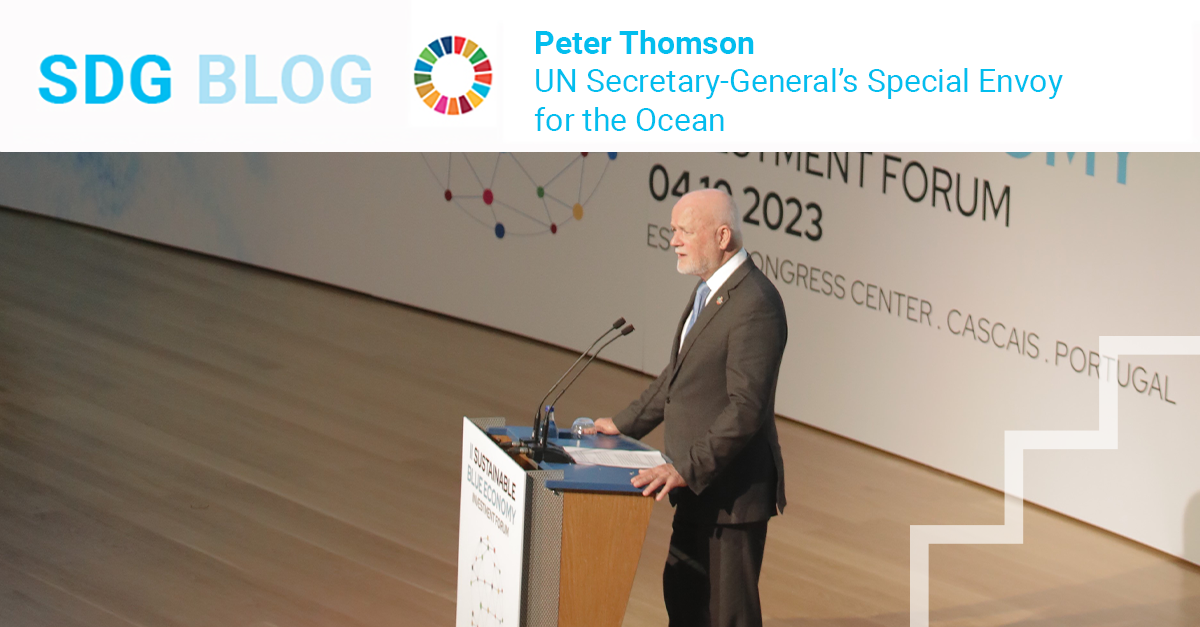SDG Blog

Why everybody should care about the state of the ocean
By Ambassador Peter Thomson, UN Secretary-General’s Special Envoy for the Ocean
With every year that passes, our ocean action work becomes ever more vital in the truest sense of that word. As a direct result of planetary warming caused by human activities, ocean temperatures are increasing alarmingly, sea level rise is accelerating, marine ecosystems are undergoing inexorable change, and coral is dying.
Since the health of the ocean is absolutely fundamental to the wellbeing of Planet Earth, it is necessary for everyone to understand that the ocean’s health is currently measurably in decline. It goes without saying that correcting the decline is a paramount responsibility for the global community. To do so we must protect the marine ecosystems essential to this planet’s web of life. For human activity has been placing them under mounting pressure, as evidenced by indices of overfishing, pollution, acidification, habitat degradation and accelerating ocean warming.
Unchecked, these threats to the ocean’s rich diversity of species will inevitably affect the livelihoods of the hundreds of millions of people who rely on these ecosystems for food and income. And so, both logic and morality call upon us to be better stewards of the ocean, to be aligned with intergenerational justice and the demand that we make peace with Nature.
Sustainable fishing practices are key to responsible ocean stewardship. By ensuring that fish populations are not overexploited and that ecosystems remain healthy, sustainable fisheries can support balanced food webs, encourage long-term resilience of marine life, and strengthen food security. It is clear, particularly for island and coastal nations, that a resilient future hinges on our ability to implement sustainable, science-based fisheries management.
Sea level rise, inexorably driven on by our addiction to fossil fuels and consequent global warming, will send low-lying atoll countries the way of Atlantis. Treasured beach-front land will become uninhabitable. The great food-basket river-deltas of Asia, and many of the great coastal cities of the world will be progressively inundated. In 2023, the UN singled out countries at high risk from rising seas and calculated that as a result, 900 million people living in low-lying coastal areas are going to be placed in acute danger.
At the United Nations, awareness of the need to improve humanity’s relationship with the ocean’s wellbeing was embodied in the adoption of a universal goal to conserve and sustainably use the ocean’s resources. I refer to the 14th of the Sustainable Development Goals (SDGs) which along with other multilateral initiatives, seeks to improve humanity’s relationship with the ocean.
In that regard, the High Seas (BBNJ) Treaty and the WTO Fisheries Subsidies Agreement should soon be ratified. International efforts are being coordinated in support of the Global Biodiversity Framework’s call for 30 percent of the ocean to be protected by 2030; and through global forums such as the recent Honiara Summit in the Solomon Islands, in close cooperation with Regional Fisheries Management Organizations and Regional Fisheries Bodies, measures are advancing for enforceable cures for the scourge of illegal fishing and overfishing.
No one sector or organization can accomplish this work alone. Comprehensively inclusive collaboration is required. For example, we know that sustainable fisheries operates best when we synergize the positive actions of governments, industries, local communities, and international organizations. And if we want those who come after us to live at peace with Nature, on a planet of relatively stable conditions, one on which they can raise children of their own within cocoons of love and understanding, we must rein in global warming and do everything within our powers to leave fossil fuels in the ground.
The good news is that a rational pathway has been laid down for us through the Paris Climate Agreement and the SDGs, a path that leads us to resilience in an equitably electrified world powered by renewable energy. Let us follow it faithfully with hearts filled with hope and determination.
Two maxims have proved true throughout the human story: firstly, that change is inevitable; and, secondly, that together we are stronger. Science has spoken on the environmental changes coming upon us, so we live in a time when human innovation must come strongly to the fore. Yes, the changes are going to test us to the brink, but it is inconceivable to me that we’re incapable of creating the solutions that will ensure resilience.
As to the second of those maxims: setting aside the negative elements, a sense of community and sharing is what human society has always been about. When we are functioning at our best, especially in times of crisis, humanity’s hallmark has been common purpose and common effort for the common good. And in these troubling times, if ever there was an era demanding common determination to protect the continuity of our place in the planetary ecosystem, we are in it. If ever there was a time to do the right thing by people and life on Planet Earth, a time to be at our very best, this is it.
As we move towards 2030 and the deadline for SDG 14, let us double down on our work to deliver on the universally agreed goal of conserving and only sustainably using the ocean’s resources. I look forward to seeing evidence of this increased resolve, when the world soon gathers in Nice, from 9 to 13 June, for the 2025 UN Ocean Conference.
You can learn more about Ambassador Thomson’s work on his website here.
* The views expressed in this blog are the author’s and do not necessarily reflect the opinion of UN DESA.
 Welcome to the United Nations
Welcome to the United Nations